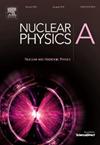重离子碰撞中多核子转移的量子扩散方法
IF 1.7
4区 物理与天体物理
Q2 PHYSICS, NUCLEAR
引用次数: 0
摘要
利用随机平均场(SMF)方法超越了时间相关哈特里-福克理论,探索了Ni64+130Te在轰击能量Ec.m.=184.3MeV和Pb206+118Sn在Ec.m.=436.8MeV时的一次生成截面。利用 GEMINI++ 代码的统计去激化模型计算了同一系统中的二次生成截面。所得结果与现有实验数据进行了比较。使用 SMF 和 GEMINI++ 进行的分析表明与实验数据有很好的一致性。本文章由计算机程序翻译,如有差异,请以英文原文为准。
A quantal diffusion approach for multinucleon transfer in heavy-ion collisions
The stochastic mean-field (SMF) approach beyond the time-dependent-Hartree-Fock theory is used to explore the primary production cross sections in at the bombarding energy MeV and at MeV. Secondary production cross-sections in the same systems are calculated using a statistical de-excitation model with GEMINI++ code. The obtained results are compared with available experimental data. Analysis employing SMF and GEMINI++ exhibit a good agreement with the experimental data.
求助全文
通过发布文献求助,成功后即可免费获取论文全文。
去求助
来源期刊

Nuclear Physics A
物理-物理:核物理
CiteScore
3.60
自引率
7.10%
发文量
113
审稿时长
61 days
期刊介绍:
Nuclear Physics A focuses on the domain of nuclear and hadronic physics and includes the following subsections: Nuclear Structure and Dynamics; Intermediate and High Energy Heavy Ion Physics; Hadronic Physics; Electromagnetic and Weak Interactions; Nuclear Astrophysics. The emphasis is on original research papers. A number of carefully selected and reviewed conference proceedings are published as an integral part of the journal.
 求助内容:
求助内容: 应助结果提醒方式:
应助结果提醒方式:


